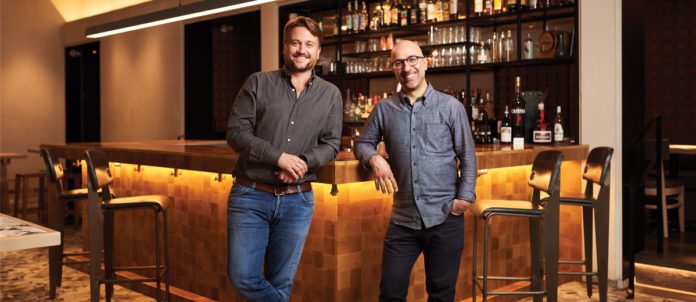It’s been a harrowing year for Erik Joyal, John Sinopoli and Rahil Hoque. Like countless operators across Canada, the partners of the Ascari Hospitality Group watched in horror as their five restaurants and events-and-catering company (Ascari Enoteca, Gare de l’est and Hi Lo Bar) went from thriving businesses to barely being able to remain open.
But the headaches and heartbreak of watching business dry up virtually overnight fuelled the operators to do the only thing they could — pivot to new revenue streams while working harder than ever to keep their doors open and advocate for essential government support.
The initial lockdown caused the partners to lay off their entire complement of 97 employees. But slowly, as restaurants were deemed essential and many re-opened to offer takeout, almost half of their team returned to re-focus on new opportunities.
In the early days, the restaurateurs pivoted to takeout and delivery, which wasn’t part of its business model. But when lockdowns became mandated, the operators created a pizza program; launched an online store featuring meal kits and pantry items; introduced a bottle-shop program; created a program to help sell menu items through its supplier network; and, even created an events program, introducing mixology demos and wine courses to its clientele.
“When customers ask us “Can you do this?,” we say yes, and we figure it out later,” quips Sinopoli. “It’s a lot of work to make a fraction of the money,” admits the chef, who’s quick to point out the level of support from customers and his team alike has been nothing short of inspirational. “Our community has supported us in such an amazing way. Regular customers came in for dinner on the patio once a week to support us — they weren’t even hungry;” he quips. “buying huge gift cards and sending it to their relatives. That support has been very humbling.”
While the blood, sweat and tears fuelled by the pandemic would have been enough to push any operator over the edge, it didn’t stop the seasoned and passionate restaurateurs from dedicating countless hours to co-found Save Hospitality, a coalition of 1,300 operators and suppliers in the restaurant eco-system, representing more than 100,000 workers who lost their jobs. The focus of the group was to shine the spotlight on the hardships of dealing with the pandemic as independent restaurateurs, but also to provide government with a five-point action plan to serve as a roadmap to get the industry back on its feet. The chef and father of a two-year-old son also took on the mantle of spokesperson for the beleaguered restaurateurs, spurring others across the country to join the fight.
Interestingly, the genesis of the advocacy group started the night Sinopoli laid off 97 employees. “We sat around a table and commiserated about all the people we had hired over 10 years, building a team and hoping they’d come back soon. I was, understandably like many restaurateurs emotionally and intellectually affected by the whole scenario.”
Sinopoli reached out to a few of his friends who worked in government, looking for guidance, and they informed him government was at a complete loss as to what to do. They suggested he write a letter and they’d help get it into the hands of politicians.
So that’s what he did: pouring out his emotions, articulating a five-point action plan and shopping it to other and restaurateurs to get their buy in while sharing it with their respective networks. And then he sent it out to as many government officials as possible to help them better understand what restaurants were dealing with. The campaign took on a life of its own, and Sinopoli and his group learned the game as they were playing it. In the process, the hashtag #SaveHospitality was born, ensuring the group’s message went viral and stayed front and centre.
“It grew and grew and grew and became this really effective rallying point,” while hitting a raw nerve in many operators and garnering their support, including the backing of Toronto-based Oliver & Bonacini Hospitality, led by its president and CEO Andrew Oliver, who became an important mouthpiece for the group, connecting Sinopoli to the right provincial political contacts and using his larger platform to amplify the group’s messaging and push the agenda forward. “There were so many people without whose megaphone, it would have been really tough to get it off the ground. They all deserve the credit,” says Sinopoli.
“When restaurants were first shut down in March 2020, it didn’t take long for the restaurateur mindset to shift from ‘How do I save my business?’ to ‘How do we save our industry?’,” says Andrew Oliver, president and CEO of Toronto-based Oliver Bonacini and director of Save Hospitality “John recognized that without targeted support for restaurants, more than 1.2 million direct jobs, along with another 400,000 jobs in our ecosystem, would be at risk. We were facing the potential collapse of the hospitality industry as we knew it and he knew he had no choice but to advocate on behalf of all independent restaurant owners and lobby every level of government for relief. As challenging and frustrating as the last 21 months have been, John has been fearless in his refusal to stand down. What’s more is he has successfully built a grassroots coalition and united our industry under one collective voice, which has been inspiring to witness.”
Along the way, Save Hospitality also partnered with One Table, an advocacy group for hospitality in Ontario and British Columbia, and Food and Wine Industry Navigator, a Facebook group dedicated to providing information to the hospitality community.
For Sinopoli, it was important to ensure government understood the unique challenges of being an independent — ranging from high rents, high labour costs and low profit margins but also to highlight the importance of the restaurant industry to the Canadian economy.
“If you can believe this, we’re an industry that employs 1.2 billion people; we’re responsible for four to five per cent of GDP and seven to nine per cent of the entire workforce of the nation,” cites Sinopoli, “yet we have no one in government whose full-time job is to monitor the restaurant industry — not one. To me that’s flabbergasting and it’s borderline irresponsible,” he says comparing it to other sectors such as farming and fisheries, which have their own Ministries.
He’s quick to add that in the past two decades, “the restaurant industry has supplanted the manufacturing sector in the province as the fabric of working society,” becoming a leading employer of entry-level workers, including young Canadians, new immigrants and women. “We hire so many people, train and bring them in to give them skills that can then be transferred to other jobs,” says Sinopoli.
It’s those inequities that has pushed Sinopoli to dig deep within his energy reserves to become an advocate for the industry. “Restaurants are a high-labour, low-profit business,” says Sinopoli. “To generate $1 million in sales, restaurants require an average of 14.9 workers. This compares to 1.2 workers for gas stations, 4.3 workers for grocery stores and 6.9 workers for clothing retail stores.” Without ongoing government support, Sinopoli says, “1.2 million jobs are at risk and the majority will not come back.”
Yet, he contends “They still treat small businesses like kindergarten children. They think we’re unsophisticated, uneducated people who are blue-collar workers,” says Sinopoli, “but the reverse is true. We had to explain to government our business because they had no clue how it works.”
While he’s quick to acknowledge that various associations exist across the industry to lobby on behalf of the industry, he believes Save Hospitality is different. “We are very much aligned with many things that Restaurants Canada, the Canadian Federation of Independent Business and the Chamber of Commerce are fighting for. There’s a lot of congruity there, but Save Hospitality exists because I didn’t think independent restaurants that are not chains, large corporations, or that don’t do massive numbers had a voice with public policy, didn’t have a voice with the media and it’s important that we create an organization — and we’re not an organization right now, we’re just a coalition of people that signed a document. I don’t claim to represent the wishes of the whole group, but we have one common goal and that’s survival.”
Having a passionate, hands-on chef who intricately understands the restaurant P&L statement, has allowed Save Hospitality to put forward an agenda that independents can relate to while also lending credibility to the cause. “When I asked the government what made us successful — how did I get on the phone with you — they told me, “You were not only passionate, and well-spoken, you were owners who understood what needs to be done to pay the rent… and you were actually offering concrete solutions.”
Moving forward, Sinopoli hopes that, as a not-for-profit group, Save Hospitality will continue to move the needle post pandemic as a way to effect further change in the industry.
Almost two years after COVID-19 became part of our lexicon, the chef is grateful for the government’s continued help with wage subsidies, forgivable loans and rent subsidies, even if he believes it was slow off the mark and needed to do more. But, he says, there’s continued need for financial help and government support. “We want to feel great about the future,” he says, but he’s worried the next six months will produce pressure points along the way as subsides wind down and lower consumer confidence remains.
“Long term we need a workforce that wants to work in hospitality because they love taking care of people,” he says. “We want to create an economic ecosystem that is resilient and fair and rewarding for people.” But “we need the government to come to the table with us. We need rent subsidies without caps and affordable debt. We need government to create programs that are specific to the hospitality industry to get consumers to feel good about going out — not just on the weekends but Monday, Tuesday and Wednesday nights too. It’s time to start living again.”
By Rosanna Caira | Photography By Daniel Alexander



















